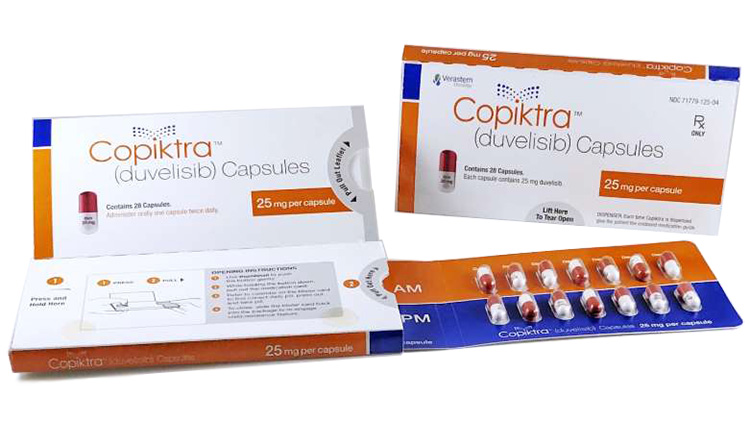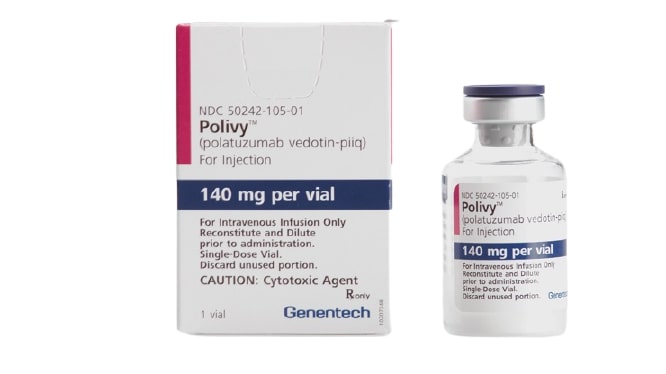Copiktra (duvelisib) vs Polivy (polatuzumab vedotin-piiq)
Copiktra (duvelisib) vs Polivy (polatuzumab vedotin-piiq)
Copiktra (duvelisib) is a small molecule inhibitor that targets the PI3K-delta and gamma pathways, which are often active in certain types of blood cancers; it is primarily used in the treatment of chronic lymphocytic leukemia (CLL), small lymphocytic lymphoma (SLL), and follicular lymphoma. Polivy (polatuzumab vedotin-piiq), on the other hand, is an antibody-drug conjugate that targets CD79b, a protein expressed on the surface of B-cells, and is used in combination with other drugs for the treatment of relapsed or refractory diffuse large B-cell lymphoma (DLBCL). The choice between Copiktra and Polivy would largely depend on the specific type of blood cancer a patient has, its stage, previous treatments, and the patient's overall health status, as each medication is tailored for different indications and has its own side effect profile.
Difference between Copiktra and Polivy
| Metric | Copiktra (duvelisib) | Polivy (polatuzumab vedotin-piiq) |
|---|---|---|
| Generic name | Duvelisib | Polatuzumab vedotin-piiq |
| Indications | Chronic lymphocytic leukemia (CLL), Small lymphocytic lymphoma (SLL), Follicular lymphoma (FL) | Relapsed or refractory diffuse large B-cell lymphoma (DLBCL) |
| Mechanism of action | PI3K inhibitor | Antibody-drug conjugate targeting CD79b |
| Brand names | Copiktra | Polivy |
| Administrative route | Oral | Intravenous |
| Side effects | Diarrhea, neutropenia, rash, fatigue, pyrexia, cough, nausea, anemia, upper respiratory infection | Neutropenia, thrombocytopenia, anemia, peripheral neuropathy, fatigue, diarrhea, fever |
| Contraindications | History of severe allergic reactions to duvelisib or any of its components | History of severe allergic reactions to polatuzumab vedotin-piiq or any of its components |
| Drug class | Antineoplastic agent, PI3K inhibitor | Antineoplastic agent, monoclonal antibody |
| Manufacturer | Secura Bio, Inc. | Genentech, Inc. |
Efficacy
Efficacy of Copiktra (duvelisib) for Lymphoma
Copiktra (duvelisib) is a small molecule inhibitor of phosphoinositide 3-kinase (PI3K) that has been approved for the treatment of certain types of lymphoma. Specifically, it is indicated for adult patients with relapsed or refractory chronic lymphocytic leukemia/small lymphocytic lymphoma (CLL/SLL) after at least two prior therapies. Duvelisib has also been approved for adult patients with relapsed or refractory follicular lymphoma (FL) after at least two prior systemic therapies. The efficacy of Copiktra was established in a clinical trial where it demonstrated a significant improvement in progression-free survival compared to the control group in patients with CLL/SLL and FL. However, it is important to note that the treatment is associated with a risk of serious toxicities, which may limit its use in certain patient populations.
Efficacy of Polivy (polatuzumab vedotin-piiq) for Lymphoma
Polivy (polatuzumab vedotin-piiq) is an antibody-drug conjugate targeting CD79b, a protein expressed on the surface of most B-cells. It is approved in combination with bendamustine and a rituximab product for the treatment of adult patients with relapsed or refractory diffuse large B-cell lymphoma (DLBCL), not otherwise specified, after at least two prior therapies. This combination has shown a significant improvement in overall survival and progression-free survival in a pivotal clinical trial compared to bendamustine with rituximab alone. The efficacy of Polivy, as part of this combination regimen, has provided a new therapeutic option for patients with relapsed or refractory DLBCL, a population that historically has had limited treatment options and poor prognosis.
Comparative Efficacy in Lymphoma Treatment
When comparing the efficacy of Copiktra and Polivy for the treatment of lymphoma, it is important to recognize that they are approved for different types of the disease and are not directly comparable. Copiktra is used for CLL/SLL and FL, while Polivy is indicated for DLBCL. Both drugs have shown efficacy in improving patient outcomes in their respective indications and represent important advancements in the treatment of relapsed or refractory lymphomas. The choice of therapy would depend on the specific type of lymphoma, the patient's prior treatment history, and their overall health status.
Considerations for Treatment Selection
When considering the use of Copiktra or Polivy for lymphoma, healthcare providers must weigh the benefits of treatment against potential risks. Both medications have been associated with serious side effects, and their use is generally reserved for patients who have not responded to or have relapsed after other treatments. The decision to use these drugs should involve a thorough discussion of the potential risks and benefits, as well as consideration of the patient's preferences and quality of life. Additionally, ongoing monitoring and supportive care are crucial to manage any adverse effects that may arise during treatment.
Regulatory Agency Approvals
Copiktra
-
European Medical Agency (EMA), European Union

-
Food and Drug Administration (FDA), USA

Polivy
-
Food and Drug Administration (FDA), USA

-
Pharmaceuticals and Medical Devices Agency (PMDA), Japan

-
Therapeutic Goods Administration (TGA), Australia

Access Copiktra or Polivy today
If Copiktra or Polivy are not approved or available in your country (e.g. due to supply issues), you can access them via Everyone.org.
How it works

Make an enquiry
Choose the medicine you want to buy, answer a couple of questions, and upload your prescription to speed things up. We’ll get back to you within 24 hours.


Make an enquiry
Choose the medicine you want to buy, answer a couple of questions, and upload your prescription to speed things up. We’ll get back to you within 24 hours.


Breeze through the paperwork
We'll guide you through the required documents for importing unapproved medicine, ensuring you have all the necessary information.


Get a personalized quote
We’ll prepare a quote for you, including medicine costs and any shipping, administrative, or import fees that may apply.


Receive your medicine
Accept the quote and we’ll handle the rest - sourcing and safely delivering your medicine.

Some text on this page has been automatically generated. Speak to your physician before you start a new treatment or medication.
Let's talk
If you have any questions, call us or send us a message through WhatsApp or email:
Contact us




